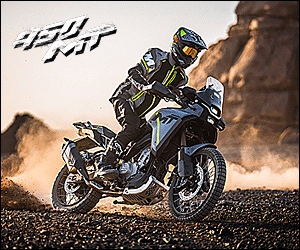Motorcycls touring the Tichka Pass into the Atlas Mountains and the western margins of the Sahara at Taddert and into Ourzazate, Fes and into Algeria.
The King of Every Kingdom
Around the world on a very small motorcycle
With J. Peter “The Bear” Thoeming
The Bear’s journey continues in Morocco. Now Marrakesh might have five-year-old extortionists, but you can swap old bras for new blankets.
Our most spectacular coup came in the campsite. An old bloke was selling warm, fuzzy, striped blankets, and he had one that was really lovely. His starting price was 350 dirhams, and he assured us that this was not his ‘rich tourist price’. After an entire evening of dedicated haggling, he settled for 35 dirhams, a t-shirt, two pairs of socks, a shirt, a tie (no, I don’t know either) and . . . one of Annie’s bras.
He had a little trouble figuring out what this wispy nylon thing was, but he got the idea when we held it onto his chest. Then he was hugely amused. ‘Ah, pour madame!’ he beamed, blushing madly.
In town, we found warm showers, in a hamam (bathhouse) next to the Regent Cinema. The first warm showers for a month, and you could stay under them for as long as you liked. Ah, luxury.
The Mols, Annie and I spent one evening on a cafe balcony overlooking the Djeema el Fna, watching the trading and performing going on below us by the light of pressure lanterns.
When we got back to the bikes, we were overwhelmed by a crowd of little boys, perhaps five years old on average, who, like a locust swarm, proceeded to pick our pockets and climb all over us and the bikes. They disappeared like smoke when a soldier came along. It was just as well that he came by, for how do you defend yourself against five-year-olds?
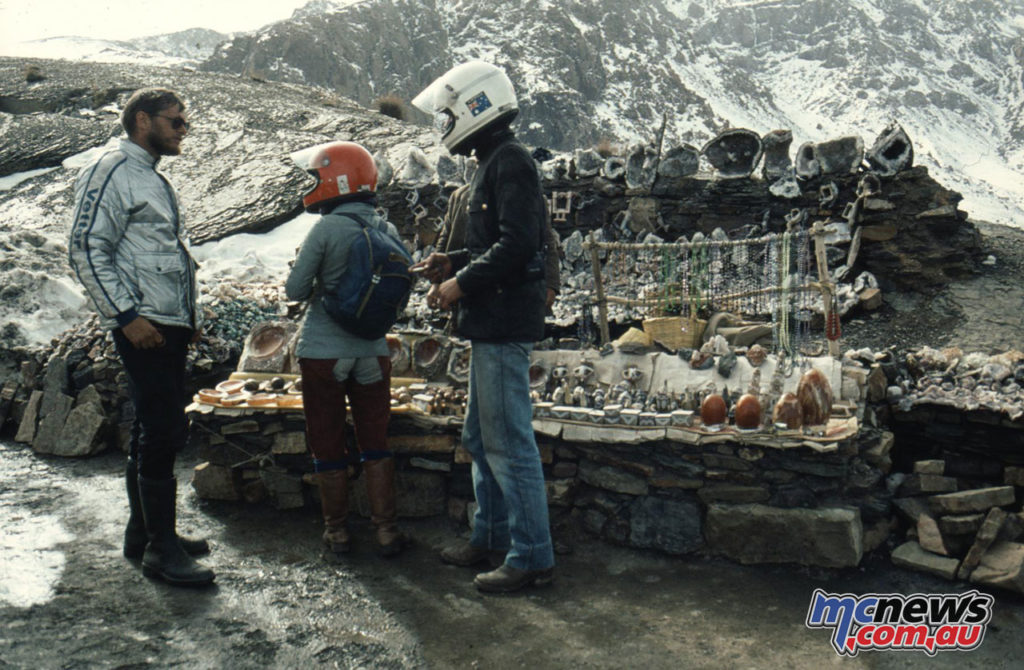
Annie and I took the Yamaha up to the snowy pass leading inland over the Atlas, to see if it was possible to get across to Ourzazate. The road was mostly clear, and where there was snow or ice on the surface the truck drivers had been spreading gravel. So the caravan of bikes moved on over Tichka Pass and down into the western margins of the Sahara.
The Atlas is quite lovely here, with sheer rock flanks and tiny stone villages, all shrouded in snow. We stopped in Taddert for tea and were bombarded with demands that we buy handfuls of the sparkling crystals found around there, but we managed to resist the temptation. Just over the pass there was a bus lying by the side of the road.
It had taken a corner too wide and rolled three times. Although the casualties had been taken away, we could still see the rust-brown stains of blood on the broken window glass, a chilling reminder to ride carefully.
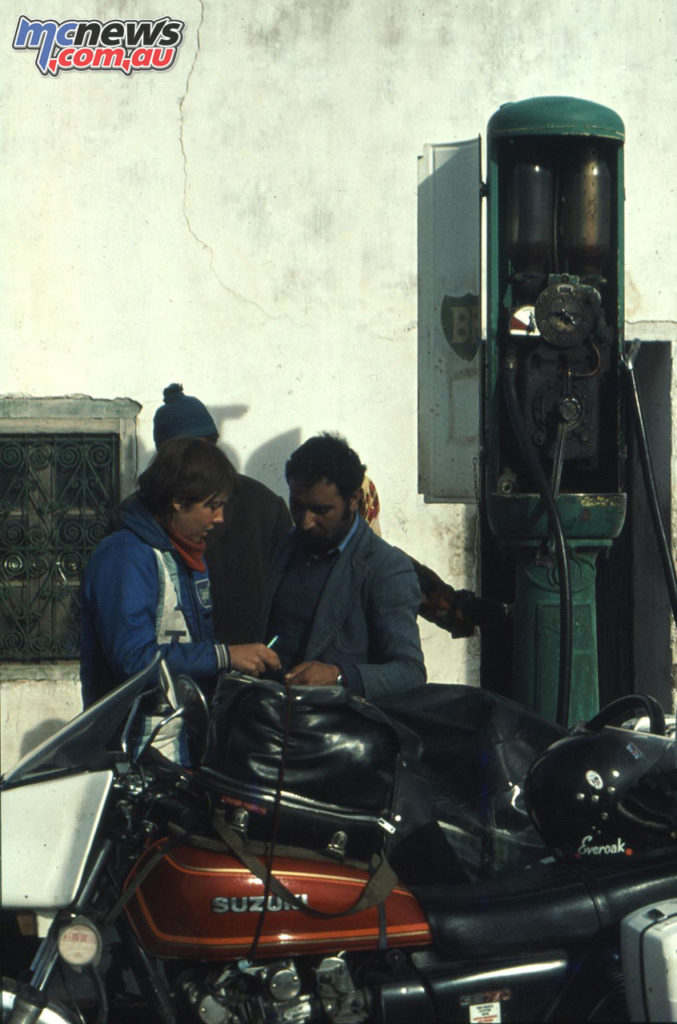
Ourzazate boasted a basic but comfortable campsite – it had running water and a helpful caretaker-cum-guard, who looked after us to the extent of making a fire off palm fronds in a tin and preparing tea for everyone on it. There was also a good market and a much-detested Club Mediterranee. The local people all resented the place because it bought nothing from them.
We pushed on north along the flanks of the Atlas, over narrow and often broken desert roads. This felt like the real desert, with very little vegetation and occasional small herds of camels or goats.
At El Kelaa an old man in a torn djellaba came up to us and started extolling the virtues of sidecars in a mixture of French, German and Arabic (or maybe Berber; it was hard to tell).
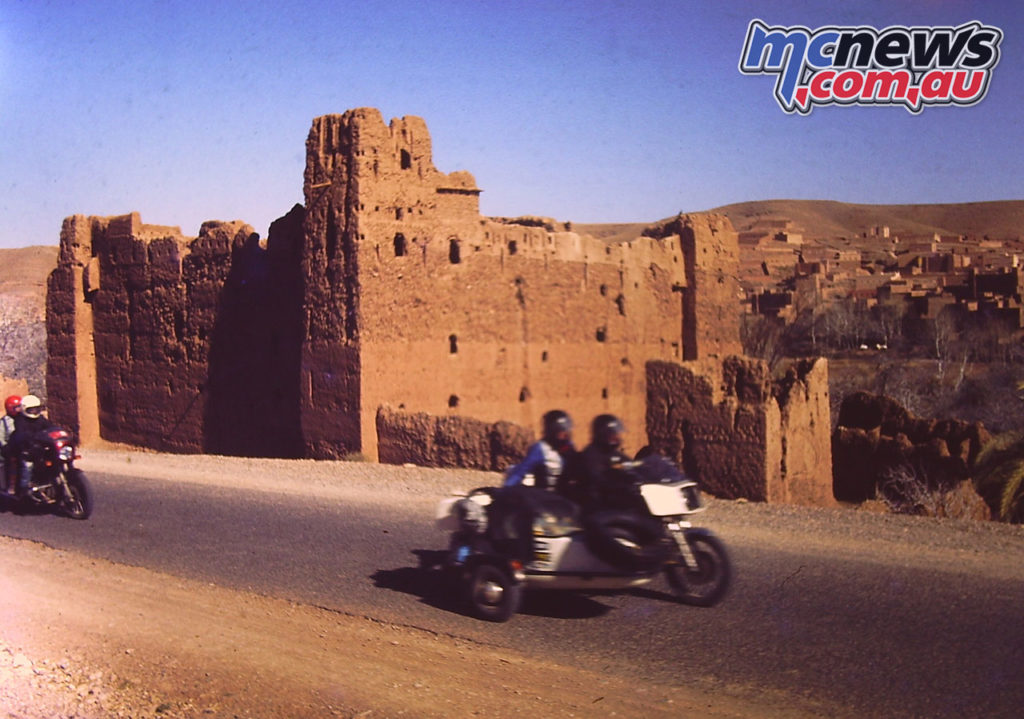
He had fought in the Second World War on the side of the Germans and they, he told us, had had sidecars with machine guns on them! And the British had come over in aeroplanes, shooting, and the French had shot him in this leg right here. Oh dear, what a lot of fun the war had been… he sounded just like some of the old soldiers back home.
The Ksar es Souk campsite had deep grass and trees but very little water. We had also run out of gas for our stove and small bottles were unobtainable, so we ate sandwiches. Later, someone told us that there was a spring just outside town where there was plenty of water and free camping, as well as palm leaves to make a fire. Ah, well.
On the way back up into the mountains we had almost alpine scenery up to the Col du Zad where we had a snowball fight. After that it looked more like the end of the world. A high plateau, bare and windswept, with snowdrifts huddling against black rock piles, this was one of the grimmest places I’d ever seen after the Anatolian Highlands.
It went on for quite a few miles, the road snow-ploughed clear to one car’s width, and we felt the cold creeping in even under our excellent Britax Alaskan suits. The plateau ended very abruptly and the road dropped through pine forests to the red tile roofs of the very French resort town of Ifrane.
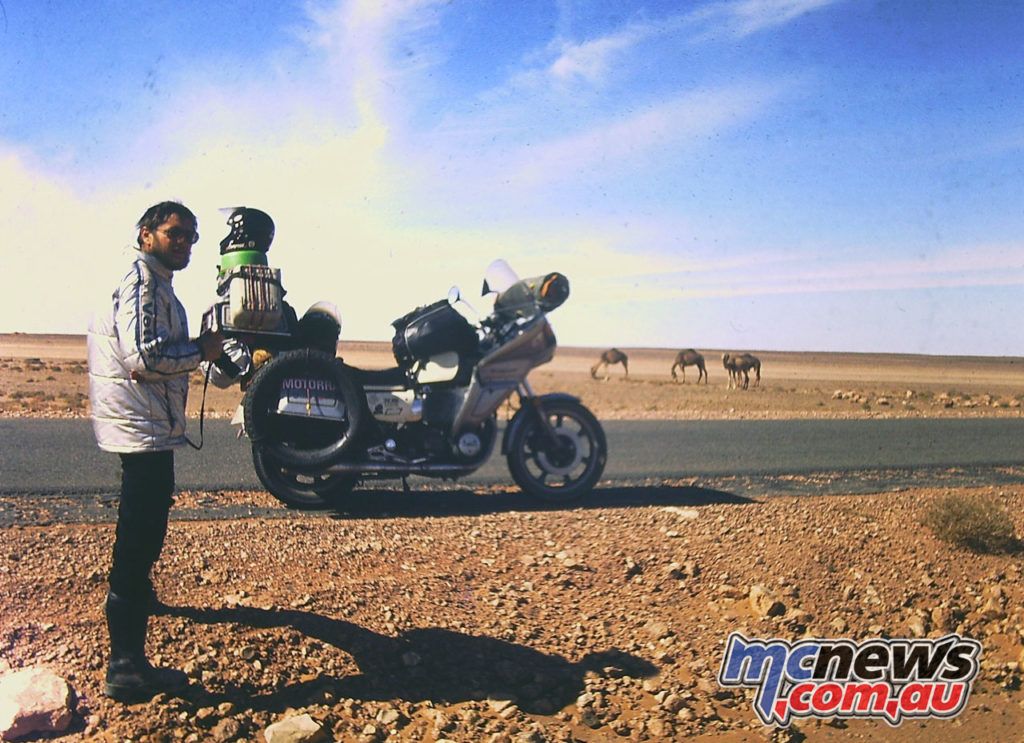
A few miles later, over good roads, we were in Fes, the new part of which looked very French too. The old town was straight out of the Dark Ages, with its narrow, convoluted, noisy passageways. We actually employed a guide – the first time I’d ever done that – and it was just as well, even though he was more interested in taking us to his friend’s shops than showing us the town.
We would never have found our way out alone. The next day was my birthday, and I was presented with a cake. Then sixteen buses loaded with 600 Danish schoolchildren invaded the camp. They came in the morning and left in the evening without ever looking at the town. A mystery.
We took advantage of the ridiculously low postage charges to send our souvenirs home and had the parcel wrapped very professionally by the semi-official parcel wrapper at the post office. He had a folder full of letters of appreciation from past customers, which he insisted we peruse while he wrapped.
After arranging to meet us again in Athens, the Mols took their leave to return to England and we turned towards the Algerian border. After an oil and filter change by the side of the road we rode past Taza, pretty on its hilltop, up to a famous cave in the mountains.
The steps leading down were in woeful condition and when, months later in London, I saw a photo I’d taken of it, it revealed ‘Bon courage’ scribbled on the wall near the bottom. It had been too dark to see this cheerful note while we were down there. We camped in the showground at Taza, watched by a cute and inquisitive donkey which then tried to steal our food and threatened to bite when we tried to chase it off.
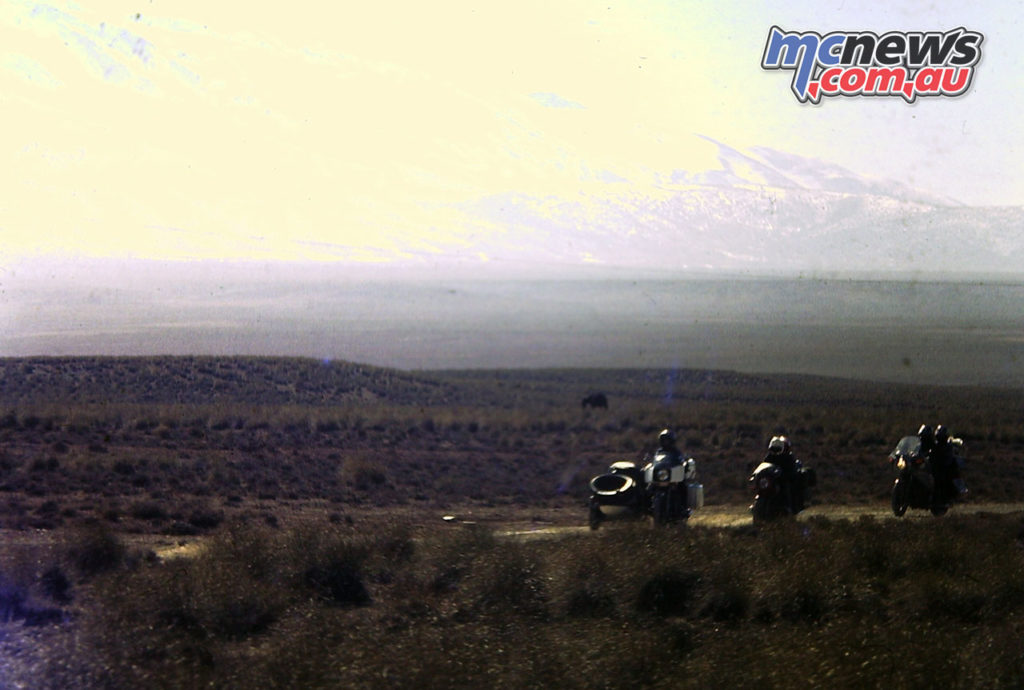
There was no problem about obtaining Algerian visas at Oujda, near the border, except that we had arrived on one of the innumerable Muslim holidays. So it was off to the border and the only campsite, to wait for three days and, in the cafe, watch the worst TV programs we’d ever been subjected to. Egyptian soap operas seem to have the lowest budgets, for sets anyway, of any shows I’ve ever seen. Every time someone closed a door the walls shook.
I had a nasty bout of ‘flu, and lay in the tent drugged to the eyeballs while tempers again deteriorated around me. I didn’t help by snapping at anyone who came near me. In the end I got fed up with it all and suggested we split up as soon as we were out of the desert.
When the consulate finally reopened, one of the questions on the visa application form was ‘Will you be sufficient during your stay in Algeria?’ The bloke opposite me, filling out his own form, grinned and said, ‘I guess the only answer to that is “Quite”,’ so that’s what we both put down. Insurance was much cheaper than it had been at the Moroccan border and we were processed quite quickly.
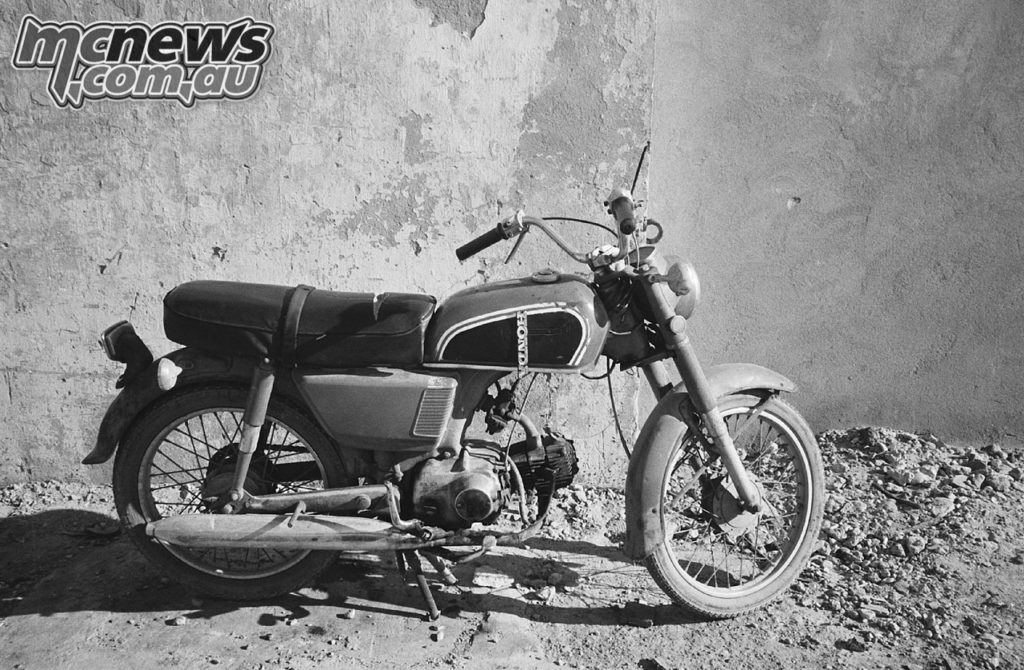
Algeria is terrific – as long as you like bread, tinned sardines and oranges… read all about it next week.



















